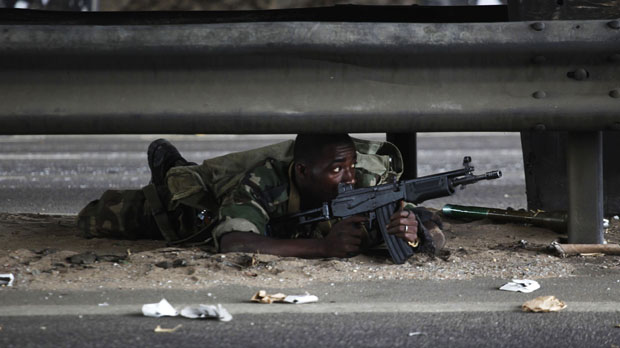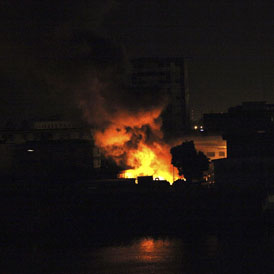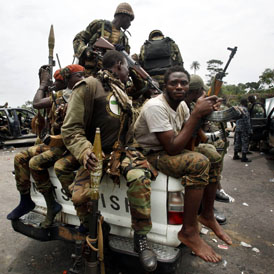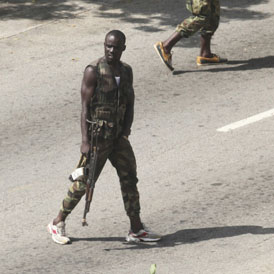Ivory Coast: UN and French airstrikes rock Abidjan
UN and French attack helicopters fire on Gbagbo’s forces as the battle for Abidjan intensifies, whilst Channel 4 News learns of reports of mass killings “across the country”.

The United Nations peacekeeping force in Ivory Coast, supported by the French military, targeted forces loyal to presidential incumbent Laurent Gbagbo, taking out their heavy weapons capabilities with attack helicopters after a number of civilians were killed in shelling in recent days and 12 UN personnel were injured.
Attacks centered on military bases in the city, but also on rocket launchers “very close” to Gbagbo’s residence in the leafy Cocody neighborhood, U.N. peacekeeping chief Alain Le Roy said during a news briefing late on Monday.
Meanwhile, several thousand troops loyal to internationally recognised presidential claimant Alassane Ouattara entered Ivory Coast’s main city Abidjan from the north in a convoy of transporters, pick-ups mounted with heavy machineguns, and 4x4s loaded with fighters bearing Kalashnikovs and rocket launchers – in what they called a “final assault” to remove the incumbent president Laurent Gbagbo
Ouattara’s commanding officer, Issiaka “Wattao” said he had 4,000 men with him plus another 5,000 already in Abidjan, and that it would take 48 hours to take control of the city from Gbagbo’s remaining forces who’ve put
The fighters aiming to topple strongman Laurent Gbagbo had succeeded in taking nearly the entire countryside in just three days last week, but they have encountered fierce resistance in Abidjan, where Gbagbo’s troops were holding on to positions around the presidential palace, Gbagbo’s residence, and state television.

Gbagbo has previously said he will “fight to the very end.” His whereabouts are not known but there are unverified reports that pro-Ouattara forces have stormed his residence.
Gbagbo is apparently “negotiating his surrender,” according to Ally Coulibaly the ambassador to France appointed by Ouattara.
“I believe Laurent Gbagbo is alive. I have learned that he is negotiating his surrender,” the diplomat said on French radio RFI.
“There have been many reports of human rights abuses by both sides across the country.” Guillaume Nguefa, senior UN investigator
Massacres
The battle for Abidjan is taking place amid a backdrop of human rights atrocities committed by both sides.
Guillaume Nguefa the deputy of the human rights division of the UN mission in Ivory Coast spoke to Channel 4 News as he set off to investigate “serious human rights violations” in Duekoue, where the International Committee of the Red Cross say 800 people were killed after the town was taken over by pro-Ouattara forces last week.
UN humanitarian chief Valerie Amos said 200 bodies were found in a single mass grave in Duekoue and that the investigative team has discovered bodies in other parts of the town as well.
A spokesman for Ouattara denied his forces had committed any war crimes in Duekoue or anywhere else in the country.
Mr Nguefa told Channel 4 News that violence has not been confined to Duekoue and that “there have been many reports of human rights abuses by both sides across the country, all of them will be investigated,” he said.
He’s received over 9,000 phone calls in the last three months from “every single part of the country,” many of them reporting “very serious violations of human rights including rapes, killings, and disappearances.”
Human Rights Watch worker Corinne Dufka – talking to Channel 4 News from Dakar after a recent mission to the Ivory Coast – described the humanitarian situation as “critical and desperate.”

She said that the volatile situation on the ground meant that monitoring human rights abuses was difficult. In Duekoue she said reports suggested Ouattara’s forces had killed civilians whilst on the offensive, and Gbagbo’s men had killed while retreating.
According to Corinne Dufka the majority of reports of civilian killings “are coming from the west and from Abidjan, but that is just going on the information that we have”.
“Worryingly we’ve heard very little from Yamoussoukro and San Pedro when the rebels swept through, experience would suggest similar levels of violence will have been used there as had been used in the west,” she added.
Even if Abidjan and Gbagbo fall quickly, she fears that violence may continue.
“There is a very high possibility of reprisal killings by Ouattara’s forces were they to take the city.” Corinne Dufka, Human Rights Watch
“A few things raise alarm bells: Ouattara’s forces the RFCI are a loose coalition from different rebel forces, Gbagbo defectors, and decommissioned soldiers, so there is a high potential for undisciplined members to commit abuses” she said
“Many of them have committed war crimes in the past, which they have not been prosecuted for. And given the level of brutality of Gbagbo’s side in Abidjan, there is a very high possibility of reprisal killings by Ouattara’s forces were they to take the city.”
In Abidjan, Hamadoun Toure – a spokesman for the UN – told Channel 4 News: “The situation is tense. There have been sporadic shootings for the last four days, people are locking their doors and staying inside.”

He said the UN have been targeted on a daily basis and have “taken three hours of sustained gunfire from Gbagbo’s Special Forces,” wounding 12 UN troops.
Toure says he has “not excluded” the possibility that massacres have taken place in parts of the country other than Abidjan and Duekoue, although it was “up to the UN human rights team to investigate” such reports.